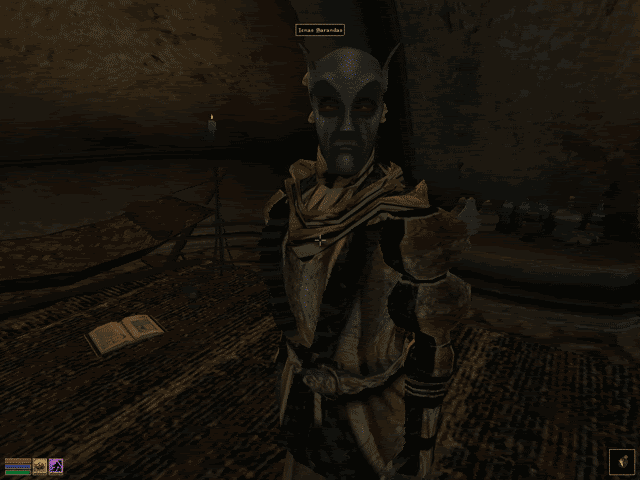
For my first journal entry, I'd like to share with everyone the experience I had that introduced me to the potential of this new medium. It happened several years ago - 2002 if I remember correctly - when I was playing the PC game The Elder Scrolls III: Morrowind.
The game, for those of you who aren't familiar, is a first person 3D role-playing game set in a high fantasy world. The style of the game is called "sandbox," which means the game is non-linear. It's basically another world to explore, with its own unique culture, history, and landscape.
The character I was playing - of my own invention, was a rogue-type, lawless and violent, with no moral code to speak of. You know, the sort of character it's fun and different to "role-play" for awhile. His name was Myshkin.
I entered a strange town with buildings that looked like the larvae of some giant insect. As I explored the town, I heard complaints of a young man in the town named Ienas Sarandas. His parents had died recently and left him alone to care for their estate, but he was abusing his new fortune and causing trouble at the local pub and gambling establishment. He also had several outstanding debts with the local merchants in the town and it was from them I received work to go collect the money owed. After some searching, I found his home - or rather his parent's home - tucked away in a corner of the town.
When I walked inside, there was Ienas - staring me down. He was wearing extravagant clothes and shiny new shoes. These were undoubtedly the goods he had bought and not paid for. I approached Ienas and asked him about his clothes. Then I mentioned I knew about his many debts and was in fact there to collect the money, one way or another. This made him angry, to say the least. My in-game disposition meter went all the way to zero. Obviously Ienas would never now just give me the money.
Since I was playing a rogue character, I pulled out my sword, ready to kill him and take the money in order to collect the bounty. I don't know why, but I hesitated and thought I'd explore the house a little first. The game is constructed in such a way that a conflict such as the one I was in can wait until you are ready. So I had a look around.
Immediately on the floor, next to the bed, I discovered a book. It was called "The Doors of the Spirit." I took a peek inside, because sometimes in Morrowind you gain useful experience from reading random books. Normally I just skimmed through them to get the gist of what they were about. Here my eyes instantly fell on a passage which read, "The ancestors are not departed. The dead are not under the earth. Their spirits are in the restless wind, in the fire's voice, in the foot-smoothed step. Pay heed to these things, and you will know your absent kin."
At that moment some remarkable things happened. First, I no longer saw Ienas Sarandas as an arrogant idler, squandering away his parent's fortune. He was just a boy who was lost in grief, trying to find some way of compensating for the void left by his parents' death. Second, despite the obvious reality, I no longer saw Ienas Sarandas as a computer-generated object at all, but instead as a fellow creature with a soul. Last, I ceased to play the game in-character. I was no longer Myshkin, the rogue-murderer, but was in fact myself. Consequently, what followed was an action that proceeded from my own inner impulse and not as an action sprung from being projected into a role I had invented for myself.
What happened you ask?
Nothing.
After this brief experience, lasting no more than a few seconds, I could not bring myself to murder Ienas Sarandas. I left him there in peace, and went on my way.
This experience was something new to me. And for the longest time I couldn't understand what had affected me so strongly by my encounter with Ienas Sarandas. It was something like how Emily Dickinson described poetry, "If I feel physically as if the top of my head were taken off, I know that is poetry." Yet it was not poetry, it was not Art with a capital "A." It was just a video game. It was something like the experience of art, but I was participating in it, and more than that even. In fact, without me the experience could not have happened at all. In some strange way I was the missing piece to a puzzle.
In the years since then I've done a lot of thinking about it, and have come to some conclusions:
1. Morrowind is not a work of interactive art. Even though it contains an experience which was for me something like the experience of art, the work as a whole does not provide that experience. In other words, the work must have a unity. For example, imagine my encounter with Ienas being the focus of a work, and not ancillary.
2. Interactive art will come from a foundation of moral decision-making. I will have lots more to say about this later, just know I don't mean simple moralizing.
3. The participant's choices must be his own choices, and not choices made "in character."
4. Only digitally re-created worlds can truly provide the context for interactive art - the closest model we have now are modern video games. Installation interactive art and other modes of interactive art can only provide an approximation.
- Daniel Stepp
